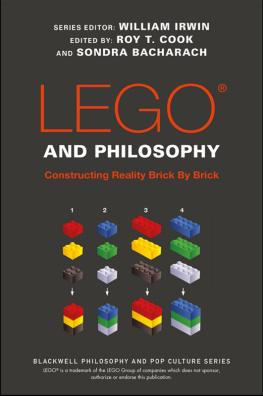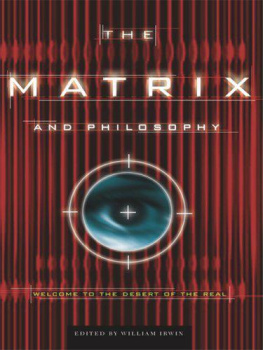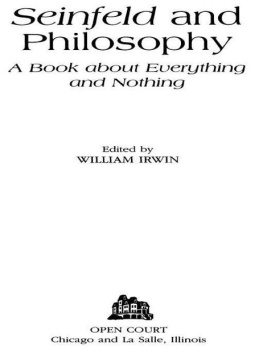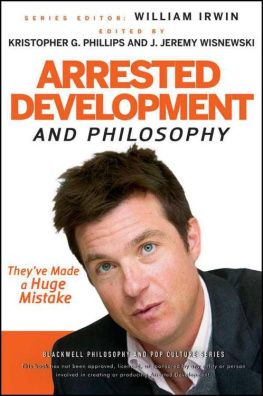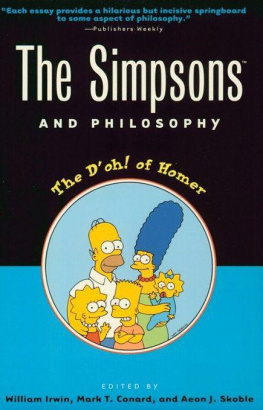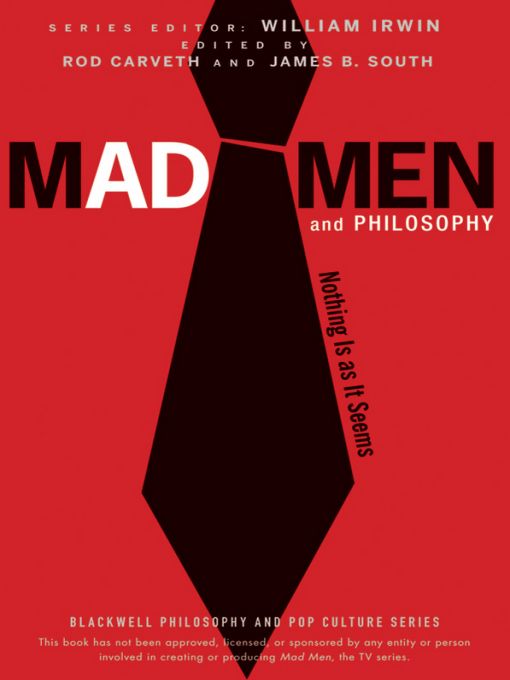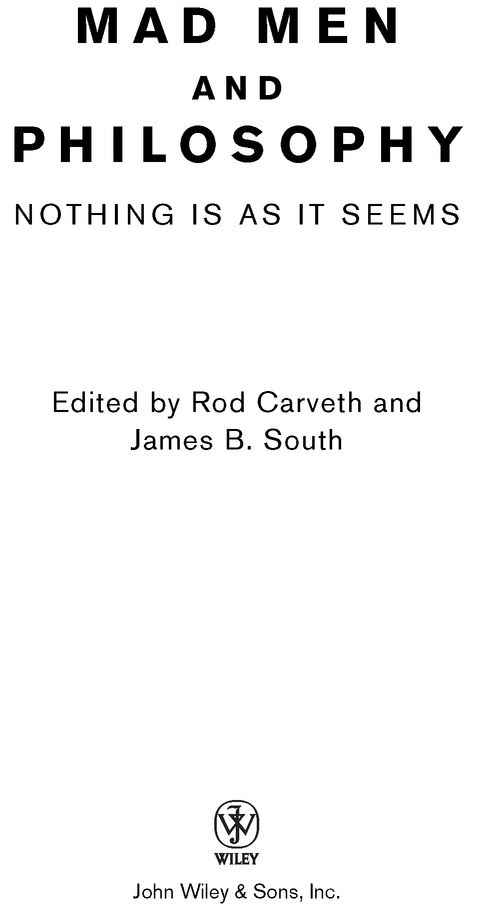Table of Contents
The Blackwell Philosophy and Pop Culture Series
Series Editor: William Irwin
South Park and Philosophy
Edited by Robert Arp
Metallica and Philosophy
Edited by William Irwin
Family Guy and Philosophy
Edited by J. Jeremy Wisnewski
The Daily Show and Philosophy
Edited by Jason Holt
Lost and Philosophy
Edited by Sharon Kaye
24 and Philosophy
Edited by Richard Davis, Jennifer
Hart Weed, and Ronald Weed
Battlestar Galactica and
Philosophy
Edited by Jason T. Eberl
The Office and Philosophy
Edited by J. Jeremy Wisnewski
Batman and Philosophy
Edited by Mark D. White and
Robert Arp
House and Philosophy
Edited by Henry Jacoby
Watchmen and Philosophy
Edited by Mark D. White
X-Men and Philosophy
Edited by Rebecca Housel and
J. Jeremy Wisnewski
Terminator and Philosophy
Edited by Richard Brown and
Kevin Decker
Heroes and Philosophy
Edited by David Kyle Johnson
Twilight and Philosophy
Edited by Rebecca Housel and
J. Jeremy Wisnewski
Final Fantasy and Philosophy
Edited by Jason P. Blahuta and
Michel S. Beaulieu
Alice in Wonderland and
Philosophy
Edited by Richard B. Davis
Iron Men and Philosophy
Edited by Mark D. White
True Blood and Philosophy
Edited by George A. Dunn and
Rebecca Housel
ACKNOWLEDGMENTS
I Think We Need to Salute That!
The work on this book required getting into character. Much whiskey, many martinis, and countless cigarettes were consumed in an effort to make the book an authentic companion to Mad Men. In the interest of research, liaisons were entered into, suits were worn, and hostile takeovers by other publishers were thwarted.
Putting together a volume such as Mad Men and Philosophy requires a team of people working togethera team that deserves to be saluted for their efforts. We would like to thank our contributing authors, who met every tight deadline with high-quality work and good cheer. Unlike Bert Cooper, Bill Irwin, the Blackwell Philosophy and Pop Culture Series editor, offered invaluable assistance every step of the way, and Constance Santisteban at Wiley saw this book through press with all the efficiency and oversight of Joan Holloway.
Rod thanks James for such a great working relationship. Anytime James wants to collaborate on another project, Rod is game.
Rod has two other people he would also like to thank. First, Alana Carveth deserves a lot of credit for putting up with a father who was more distracted and forgetful than usual. Its not easy to raise a parent at seventeen, but Alana really rose to the occasion. Second, Rod would like to thank Nina Spiller. Nina came into his life just as the book project was taking off. A fellow Mad Men fan, Nina provided love, support, and encouragement that made editing this volume much, much easier. Rod feels truly blessed to have two such wonderful women in his life.
James would like to thank Beth OSullivan and Lula Hopkins, the Allison and Hildy in his life, for putting up with his taking on a new project with the time commitments that entailed. He knows it made their jobs just a bit harder. Working with someone youve never met in person can be tricky. Rod made it very easy, and James enjoyed the collaborative effort.
Last but not least, we want to thank you, the reader, for your interest in the show and in this book. And we want to assure you that no one lost a foot throughout the entire process.
INTRODUCTION
A Thing Like That
Take off your shoes. Shut the door. Have a seat. Kick back in your Eames chair. Admire that Rothko print. Pour your favorite drink. And prepare to enter the philosophical world of Mad Men, or at least the world of philosophers thinking and writing about Mad Men.
Mad Men premiered in July 2007 to immediate critical acclaim. Set in 1960, the series seemed both exotic and nostalgic. It showed a past that many of us had not lived through, and for those who had lived through it, the episodes shined a new light on old experiences. Over the course of the first three seasons, Mad Men reminded us of many uncomfortable truths, from the prevalence of drinking and smoking to the systemic sexism, racism, and homophobia that were ever-present in the early 1960s. It also reminded us of a glamour long since lost as we became reacquainted with the fashions of the era, the luxurious civility of airline flight, and the forgotten manners and mores of a previous generation. And Mad Men poignantly dramatized the reactions of people to events we still commemorate today. By taking us inside a world in which people struggled to understand these events as they occurred, and showing us those people in their historical context, Mad Men helped us understand better both the past and the present.
Few series have distinguished themselves as quickly as Mad Men. But the audience didnt need the Golden Globes or the Screen Actors Guild to tell them Mad Men was something special, something delightfully disturbing. This shows audience knows quality when it sees it. From the first episode viewers were immersed in a morally ambiguous atmosphere of corporate and family life. We were introduced to likeable characters performing questionable, and at times clearly immoral, actions. Somehow we found ourselves rooting for Don Draper to sell cigarettes, get away with dalliances, and conceal his true identity. And we found Sterling Cooper an alluring and attractive setting, all the while cringing at the subservient role of the women in the office.
The chapters that follow were written by Mad Men fans for Mad Men fans who cant help but think about the characters, events, and issues long after they turn off the television. Whether you want to think more about the role of women in the series, or the morality of advertising, or the way to lead a meaningful life, you will find guidance in these pages.
Because we didnt have a big advertising budget for this book, we had to write this introduction ourselves. Philosophers arent known as great salesmen, but hopefully this little pitch was enough to close the deal. Please read on.
PART ONE
PEOPLE MAY SEE THINGS DIFFERENTLY, BUT THEY DONT REALLY WANT TO: MAD MEN AND PROBLEMS OF KNOWLEDGE AND FREEDOM
One
WHAT FOOLS WE WERE:MAD MEN, HINDSIGHT, AND JUSTIFICATION
Landon W. Schurtz
That Mad Men takes place in the 1960s is no accident. The creator, Matthew Weiner, could have made a series about modern advertising executives, but he chose not to. By showing us the differences between Don Drapers time and ours, Mad Men deftly underscores the ways in which we arent so different after all. One thing does stand out, however, at least for me. Every time I watch the show, I find myself asking, Were these people just stupid?
Let me explain myself. I dont


